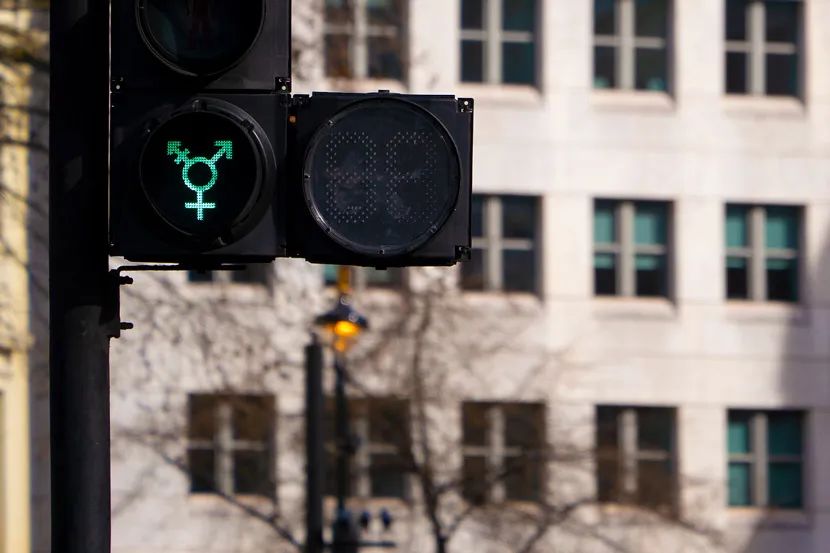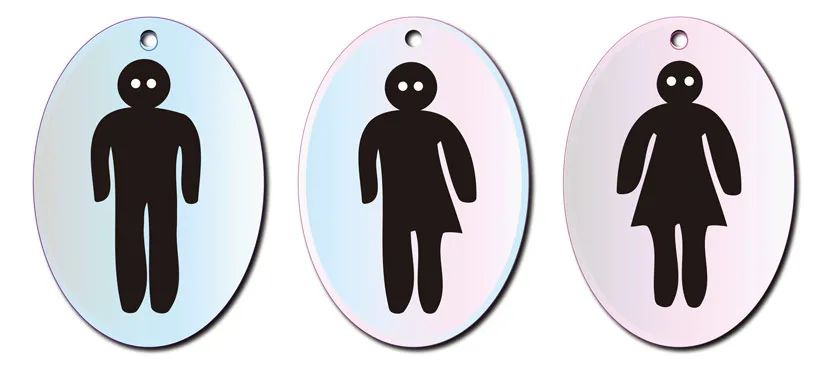
Transgender Chinese face widespread discrimination at work. But some believe the courts could offer an avenue for change
The 25-year-old — whose name has been changed for privacy reasons — is transgender, and he’d learned through experience that his gender identity might cause issues with his new manager, a married woman in her 40s. He felt it would be better to be open from the beginning.
To his relief, the woman responded positively to their initial chat. “She said she was OK with it and emphasized she accepted and respected her sexual minority colleagues,” Eddy tells Sixth Tone.
But once Eddy started work, he quickly realized his boss’s acceptance only stretched so far.
When assigning tasks in the staff work group on social app WeChat, the woman referred to Eddy as “she.” Eddy messaged her privately, asking if she could use the male pronoun in the future. This time, however, she was less understanding.
“She withdrew the message, but claimed I was asking for special treatment,” Eddy says.
Over the following week, Eddy tried to smooth things over with his boss. She asked him to make a list of issues to which she should pay attention, which he did. But when Eddy requested to have a single room or share with a male colleague on business trips, the boss refused, asserting it was “impossible” for anyone to see him as a man.
By May, Eddy felt so uncomfortable he decided to quit.
“It got awkward and affected my enthusiasm for my work,” he says. “I chose this job because I thought I wouldn’t have to handle this kind of issue here, but it still happened.”

Workplace discrimination is one of the most severe issues. According to a 2017 report, the unemployment rate among transgender Chinese is nearly 12% — three times higher than the official national rate at the time. Over 40% choose not to express their gender identity at work.
The pressure to conform to gender norms in the office — and fear of the consequences for not doing so — takes a severe toll on the mental health of China’s trans workers, according to Huang Xi, founder of the Psychological Team for Trans People, a Guangzhou-based nonprofit that offers psychological support to transgender individuals.
“Trans people experience high levels of social and workplace discrimination and low levels of support, which leads to depression and anxiety,” says Huang.
According to Huang, it’s still common for trans people who come out at work to be discriminated against, fired, or demoted, which leads many to conceal their gender identities. Those working in state-owned enterprises and government units tend to be especially fearful, she says.
“Getting a promotion is hard for them, because employers might feel their mental state isn’t stable, or they’ll have surgery in the future, which they (employers) consider very troublesome,” says Huang.
Now, however, transgender Chinese are starting to push back.
This past December, a court in the eastern city of Hangzhou heard one of China’s first employment rights lawsuits involving discrimination against a transgender individual. The plaintiff, 31-year-old Jessy Ma, sued her former employer for unfair dismissal, having been fired shortly after undergoing gender confirmation surgery in October 2018.
Ma, who identifies and dresses as a woman, had been open about her gender identity since joining the cultural promotion agency in 2015. After she returned to work two months after her surgery, however, she says the company’s human resources manager asked her to resign, since the firm was uncertain whether to assign her a male or female role.
When Ma refused, the company terminated her contract on grounds of “excessive lateness.” Ma disputed this, arguing the firm had a flexible working culture and that she was the only person fired despite arriving at the same time as several other colleagues.
The case has triggered widespread discussion on Chinese social media, bringing issues such as gender reassignment and transgender rights further into the public consciousness than ever before. Ma, who sued for 10,000 yuan ($1,400) in compensation and a public apology from her former company, tells Sixth Tone she hopes to inspire others to stand up and demand equal treatment.
“What I want is not just a winning outcome, but to help the general population know more about the transgender community and encourage more trans people to be who they really are,” says Ma.
In January, the court ruled against Ma, concluding there was insufficient evidence that her dismissal was related to her transgender identity. But Ma appealed soon after, and a second hearing took place in Hangzhou May 28. The verdict of this second hearing has yet to be announced.

“Pluralism is a future trend that needs to be propelled by some landmark, ground-breaking cases,” says Zhang.
For Zhang, the courts offer the best avenue for the transgender community to assert their rights for equal treatment. Given the group’s relatively small size compared to other social minorities, the lawyer believes it’s unrealistic to expect the government to pass legislation focusing on transgender issues at this stage.
The Supreme People’s Court, however, might be more easily persuaded to act, according to Zhang. If there are dozens of employment rights lawsuits involving transgender individuals and the cases attract public attention, he says the court may issue judicial interpretations and documents specifying under what conditions employers may legally terminate contracts with members of sexual minority groups.
Transgender Chinese have already scored some notable legal victories. In 2017, a plaintiff from the southwestern city of Guiyang filed a personality infringement lawsuit under China’s tort law, alleging a company had fired him because of his gender expression.
The court was in favor of the plaintiff, concluding “the individual’s gender identity and gender expression fall under the scope of protection of general personality rights” — the first time the terms “gender identity” and “gender expression” had been used in a Chinese legal judgment.
In another similar case in January, the judge recognized the importance of sex reassignment surgery and called on employers and their staff to treat transgender colleagues with tolerance.
Ma’s willingness to fight back against her employer has made a deep impression on Eddy, the former music events company employee. He admits that if he’d been in her situation, he probably would have resigned to avoid trouble. But he realizes that attitude can be self-defeating.
“After a while, I might find I have nowhere left to go,” he says.
Years of worrying about fitting in have worn Eddy down. As a cognitive science student in the United States, he lived as a woman for four years, fearing that coming out as transgender would condemn him to a lifetime of misery and marginalization. His struggles with his gender identity caused him to become depressed.
In 2017, Eddy moved back to China and started a 10-month internship in the southern city of Shenzhen. He earned the respect of his boss and was well liked by his colleagues, who assumed he was a lesbian because of his masculine gender expression. But he kept everyone at a distance, feeling it’d be unsafe to come out as transgender.
“I wish I could have lived as my authentic self and connected with my colleagues on a deeper level,” Eddy says. “But if I had come out, I knew I would’ve been treated differently, and it wasn’t a risk I could afford to take.”

“Driven by the pink economy, companies want to establish a diverse and inclusive corporate image and culture,” says Huang. “But their friendship is mainly aimed at the ‘LGB’ group. The ‘T’ is often ignored.”
Huang hopes domestic firms will eventually emulate multinational companies like Goldman Sachs and Lloyds Bank, which provide transgender employees undergoing gender confirmation surgery with financial support and paid vacation.
“It’ll take a long time for domestic enterprises to achieve that,” says Huang. “But if some multinational firms are willing to bring these policies to China, then it’ll show it’s possible to implement them here as well.”
There are some signs good practices are starting to spread. When Zx Ventures, part of global brewing conglomerate Anheuser-Busch InBev, opened offices in Shanghai three years ago, the firm provided male, female, and gender-neutral bathrooms throughout the building.

“Since the surgery, I’ve been constantly worried about being caught and fired,” says Kim, whose name has also been changed for privacy reasons.
As genderqueer, Kim’s gender expression shifts between masculine and feminine. Inside the company, however, Kim is simply perceived as a man who sometimes wears pink outfits and talks in a woman’s voice. These days, Kim keeps their hair short and tries not to stand out.
“They thought I was weird, and my boss asked me to consider other colleagues’ feelings and wear men’s clothes,” says Kim. “When they laugh at me, I just laugh with them.”
Jude Xiao, a 25-year-old transgender man, feels he’s paid a price for expressing his gender identity. After quitting his sales job in 2018, he applied for more than 300 jobs in Beijing and went on over 20 interviews, but didn’t get a single offer.
One rejection was particularly hard to take. A friend helped Xiao secure an interview at a publishing firm, and he felt the discussion went well, but he didn’t get the job. Later, his friend told him the HR manager had called Xiao “excellent in every way,” but said Xiao’s short undercut hairstyle wasn’t appropriate for a woman.
“I was shocked,” says Xiao. “I couldn’t help wondering if that was the reason I’d failed the other interviews, too.”
Eventually, economic pressures forced Xiao to lower his expectations and apply for less attractive jobs. He ended up taking a job at a movie theater owned by a film group, checking tickets and selling popcorn.
“HR thought it was great to find a graduate like me for such a position,” he says. “I started the day after the interview.”
Xiao now works for the film group’s online platform. His salary has been cut in half since the pandemic emerged, but he’s scared of leaving and being unable to find another job.
“I know it’ll be difficult to do it all over again,” says Xiao. “It makes me anxious.”
After his discouraging experience at the events company, Eddy isn’t sure when he’ll start looking for work. He’s currently helping out at a transgender nonprofit, writing music, translating texts, and organizing events.
“My parents support me financially,” he says. “I have the privilege to avoid working right now. But they don’t know I’m trans yet, so I don’t know how long this can last.”
Additional reporting: Luo Meihan and Wu Ziyi; editor: Dominic Morgan.
(Header image: Falko Mueller Fotodesign/IC)
Download the new Sixth Tone app at the App Store or Google Play

APK file for Android:
https://image4.sixthtone.com/pkg/sixthtone.apk
(Copy URL and open in browser)